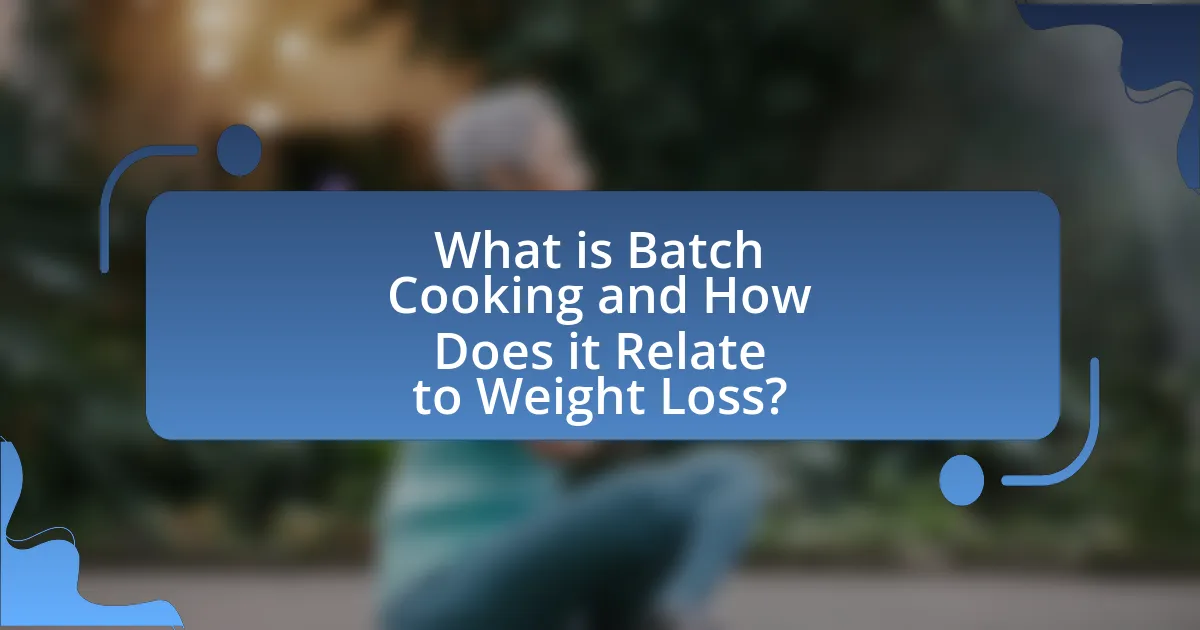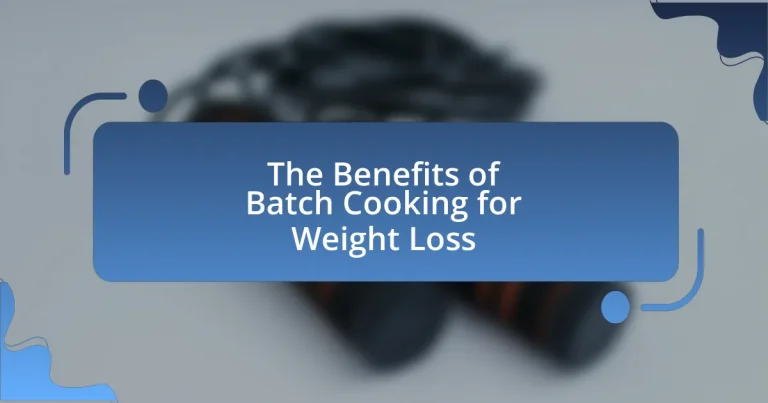Batch cooking is the practice of preparing large quantities of meals in advance, which can significantly support weight loss by promoting healthier eating habits and effective portion control. This article explores how batch cooking aids in weight management by ensuring nutritious meals are readily available, reducing reliance on unhealthy convenience foods, and facilitating better dietary choices. Key benefits include improved portion control, time savings, reduced stress around meal planning, and enhanced adherence to dietary guidelines. Additionally, practical tips for effective batch cooking, including meal planning, ingredient selection, and storage methods, are discussed to help individuals maximize the advantages of this approach for weight loss.

What is Batch Cooking and How Does it Relate to Weight Loss?
Batch cooking is the practice of preparing large quantities of meals in advance, which can significantly aid in weight loss by promoting healthier eating habits and portion control. By cooking meals in bulk, individuals can ensure they have nutritious options readily available, reducing the likelihood of resorting to unhealthy convenience foods. Studies indicate that meal prepping can lead to better dietary choices, as it encourages the consumption of whole foods and balanced meals, ultimately supporting weight management goals.
How does batch cooking support weight loss goals?
Batch cooking supports weight loss goals by enabling individuals to prepare healthy meals in advance, which reduces the likelihood of unhealthy food choices. When meals are prepped and portioned, it becomes easier to control calorie intake and maintain balanced nutrition. Research indicates that meal planning and preparation can lead to healthier eating habits, as individuals are less likely to resort to fast food or high-calorie snacks when they have nutritious options readily available. Additionally, batch cooking can save time and reduce stress around meal times, further promoting adherence to a weight loss plan.
What are the nutritional benefits of batch cooking for weight loss?
Batch cooking provides significant nutritional benefits for weight loss by allowing individuals to prepare healthy meals in advance, ensuring portion control and balanced nutrition. By cooking in bulk, individuals can incorporate a variety of whole foods, such as vegetables, lean proteins, and whole grains, which are essential for a nutrient-dense diet. This practice reduces the likelihood of impulsive eating and reliance on unhealthy convenience foods, which often contain high levels of calories, sugars, and unhealthy fats. Studies indicate that meal prepping can lead to better dietary adherence and lower caloric intake, contributing to effective weight management. For example, research published in the “Journal of Nutrition Education and Behavior” found that individuals who engaged in meal preparation were more likely to consume a higher intake of fruits and vegetables, which are crucial for weight loss due to their low calorie density and high fiber content.
How does batch cooking help with portion control?
Batch cooking aids in portion control by allowing individuals to prepare meals in predetermined quantities, which helps prevent overeating. When meals are cooked in bulk and divided into specific serving sizes, it becomes easier to manage caloric intake and adhere to dietary goals. Research indicates that pre-portioned meals can lead to a reduction in food waste and promote healthier eating habits, as individuals are less likely to consume larger portions when meals are already measured out.
Why is batch cooking becoming popular among those trying to lose weight?
Batch cooking is becoming popular among those trying to lose weight because it allows for better meal planning and portion control. By preparing meals in advance, individuals can ensure they have healthy options readily available, reducing the likelihood of impulsive eating or choosing unhealthy foods. Studies show that meal prepping can lead to healthier eating habits and weight loss, as it encourages the consumption of home-cooked meals, which are typically lower in calories and higher in nutrients compared to takeout or processed foods.
What trends are influencing the rise of batch cooking for weight loss?
The rise of batch cooking for weight loss is influenced by several key trends, including the increasing popularity of meal prepping, the focus on healthy eating, and the demand for convenience. Meal prepping has gained traction as individuals seek to save time and reduce food waste, allowing them to prepare healthy meals in advance. The emphasis on nutritious diets, driven by health awareness and the prevalence of diet-related diseases, encourages people to cook at home rather than rely on processed foods. Additionally, the fast-paced lifestyle of many individuals necessitates convenient meal solutions, making batch cooking an appealing option for those looking to maintain a healthy diet while managing their time effectively.
How does batch cooking fit into modern dietary practices?
Batch cooking aligns with modern dietary practices by promoting meal preparation efficiency and portion control, which are essential for weight management. This method allows individuals to prepare large quantities of healthy meals in advance, reducing the likelihood of impulsive eating and reliance on convenience foods that are often high in calories and low in nutrients. Research indicates that meal prepping can lead to healthier eating habits, as individuals who engage in batch cooking are more likely to consume balanced meals and maintain portion sizes, ultimately supporting weight loss goals.

What are the Key Benefits of Batch Cooking for Weight Loss?
Batch cooking significantly aids weight loss by promoting portion control and reducing the likelihood of unhealthy eating. By preparing meals in advance, individuals can manage their calorie intake more effectively, as they have pre-portioned meals ready to consume, which minimizes impulsive food choices. Research indicates that meal prepping can lead to healthier eating habits, as individuals are less likely to resort to fast food or high-calorie snacks when they have nutritious meals readily available. Additionally, batch cooking saves time and money, allowing individuals to focus on their weight loss goals without the stress of daily meal preparation.
How does batch cooking save time and effort in meal preparation?
Batch cooking saves time and effort in meal preparation by allowing individuals to prepare multiple meals at once, significantly reducing the daily cooking time. This method streamlines the cooking process, as ingredients can be chopped, cooked, and stored in bulk, minimizing the need for repetitive tasks throughout the week. Studies indicate that batch cooking can cut meal prep time by up to 50%, enabling individuals to focus on other activities while ensuring they have healthy meals readily available.
What are the time-saving aspects of batch cooking?
Batch cooking saves time by allowing individuals to prepare multiple meals in one cooking session, significantly reducing daily cooking time. This method streamlines meal preparation, as ingredients are chopped, cooked, and stored all at once, eliminating the need for daily meal planning and cooking. Research indicates that batch cooking can cut meal prep time by up to 50%, making it a practical solution for busy individuals. Additionally, having pre-cooked meals readily available minimizes the temptation to opt for unhealthy fast food options, further supporting weight loss goals.
How can batch cooking reduce stress related to meal planning?
Batch cooking can significantly reduce stress related to meal planning by providing pre-prepared meals that eliminate daily cooking decisions. This approach allows individuals to allocate specific time for meal preparation, resulting in a structured routine that minimizes last-minute food choices and the associated anxiety. Research indicates that planning meals in advance can lead to healthier eating habits, as it reduces reliance on convenience foods, which are often less nutritious. By having meals ready to go, individuals can save time during busy weekdays, leading to a more organized lifestyle and decreased stress levels.
In what ways does batch cooking promote healthier eating habits?
Batch cooking promotes healthier eating habits by facilitating meal preparation in advance, which reduces the likelihood of impulsive, unhealthy food choices. When individuals prepare meals in bulk, they can control portion sizes and ingredients, leading to more balanced nutrition. Research indicates that meal prepping can increase the consumption of fruits and vegetables, as individuals are more likely to include these in their planned meals. Additionally, a study published in the Journal of Nutrition Education and Behavior found that individuals who engage in meal preparation are more likely to adhere to dietary guidelines, ultimately supporting weight management and healthier eating patterns.
How does having meals prepped in advance influence food choices?
Having meals prepped in advance significantly influences food choices by reducing the likelihood of impulsive eating and promoting healthier options. When meals are prepared ahead of time, individuals are less inclined to opt for convenience foods that are often high in calories and low in nutritional value. Research indicates that meal prepping can lead to better dietary adherence, as individuals are more likely to consume balanced meals that align with their health goals. A study published in the Journal of Nutrition Education and Behavior found that individuals who engaged in meal preparation reported higher fruit and vegetable intake, demonstrating a direct correlation between meal prep and healthier food choices.
What role does batch cooking play in reducing food waste?
Batch cooking significantly reduces food waste by allowing individuals to prepare large quantities of meals at once, which minimizes the likelihood of ingredients spoiling before they are used. This method encourages the use of perishable items, as they are cooked and consumed in a timely manner, thus preventing them from being discarded. According to a study published by the Food Waste Reduction Alliance, meal preparation strategies like batch cooking can lead to a reduction in food waste by up to 30%, as it promotes better planning and utilization of food resources.

What Practical Tips Can Enhance the Benefits of Batch Cooking for Weight Loss?
Practical tips that can enhance the benefits of batch cooking for weight loss include planning meals in advance, using portion control, and incorporating a variety of nutrient-dense ingredients. Planning meals helps ensure that healthy options are readily available, reducing the likelihood of unhealthy choices. Portion control is crucial as it allows individuals to manage calorie intake effectively; studies show that people tend to eat more when larger portions are served. Incorporating a variety of ingredients, such as lean proteins, whole grains, and plenty of vegetables, not only boosts nutritional value but also keeps meals interesting, which can aid in adherence to a weight loss plan.
What are the best practices for effective batch cooking?
The best practices for effective batch cooking include planning meals in advance, using versatile ingredients, and properly storing cooked food. Planning meals allows for efficient grocery shopping and ensures a balanced diet, while versatile ingredients can be used in multiple recipes, reducing waste. Proper storage techniques, such as using airtight containers and labeling, help maintain food freshness and safety, which is crucial for weight loss. Research indicates that meal prepping can lead to healthier eating habits and better portion control, supporting weight loss goals.
How can one choose the right recipes for batch cooking?
To choose the right recipes for batch cooking, one should prioritize meals that are nutritious, versatile, and suitable for freezing or reheating. Selecting recipes that incorporate whole grains, lean proteins, and a variety of vegetables ensures balanced nutrition, which is essential for weight loss. Additionally, recipes that can be easily modified or combined with different ingredients allow for variety throughout the week, preventing meal fatigue. Research indicates that meal prep can lead to healthier eating habits and better portion control, which are crucial for weight management. Therefore, focusing on these criteria helps in selecting effective batch cooking recipes that support weight loss goals.
What storage methods are best for maintaining meal quality?
The best storage methods for maintaining meal quality include vacuum sealing, refrigeration, and freezing. Vacuum sealing removes air from packaging, which helps prevent oxidation and spoilage, thereby preserving flavor and texture. Refrigeration slows down bacterial growth, making it ideal for short-term storage of cooked meals, while freezing halts microbial activity and retains nutrients for long-term storage. Studies show that vacuum-sealed foods can last 3 to 5 times longer than those stored in traditional packaging, and freezing can preserve the quality of meals for several months without significant nutrient loss.
How can individuals troubleshoot common challenges in batch cooking?
Individuals can troubleshoot common challenges in batch cooking by planning meals in advance, using proper storage techniques, and adjusting cooking times for different ingredients. Effective meal planning involves selecting recipes that share ingredients, which minimizes waste and simplifies the cooking process. Proper storage techniques, such as using airtight containers and labeling meals with dates, help maintain freshness and prevent spoilage. Additionally, adjusting cooking times ensures that all ingredients are cooked evenly, which is crucial for both taste and food safety. These strategies are supported by research indicating that organized meal preparation can lead to healthier eating habits and reduced food waste, ultimately aiding in weight loss efforts.
What are the common pitfalls to avoid when batch cooking for weight loss?
Common pitfalls to avoid when batch cooking for weight loss include over-preparing meals, neglecting portion control, and using unhealthy ingredients. Over-preparing can lead to excessive calorie intake if meals are not consumed in moderation. Neglecting portion control often results in larger servings than intended, which can hinder weight loss efforts. Additionally, using unhealthy ingredients, such as high-calorie sauces or processed foods, can counteract the benefits of batch cooking by increasing overall caloric intake. These pitfalls can undermine the effectiveness of batch cooking as a strategy for weight loss.
How can one adapt batch cooking strategies to fit personal dietary needs?
To adapt batch cooking strategies to fit personal dietary needs, individuals should first assess their specific dietary requirements, such as allergies, intolerances, or nutritional goals. For example, someone with a gluten intolerance can substitute traditional grains with gluten-free alternatives like quinoa or brown rice in their batch recipes. Additionally, customizing portion sizes and ingredient choices allows for better alignment with caloric intake goals, which is crucial for weight loss. Research indicates that meal planning and preparation can lead to healthier eating habits and improved weight management, as it reduces reliance on convenience foods that may not meet dietary needs.


